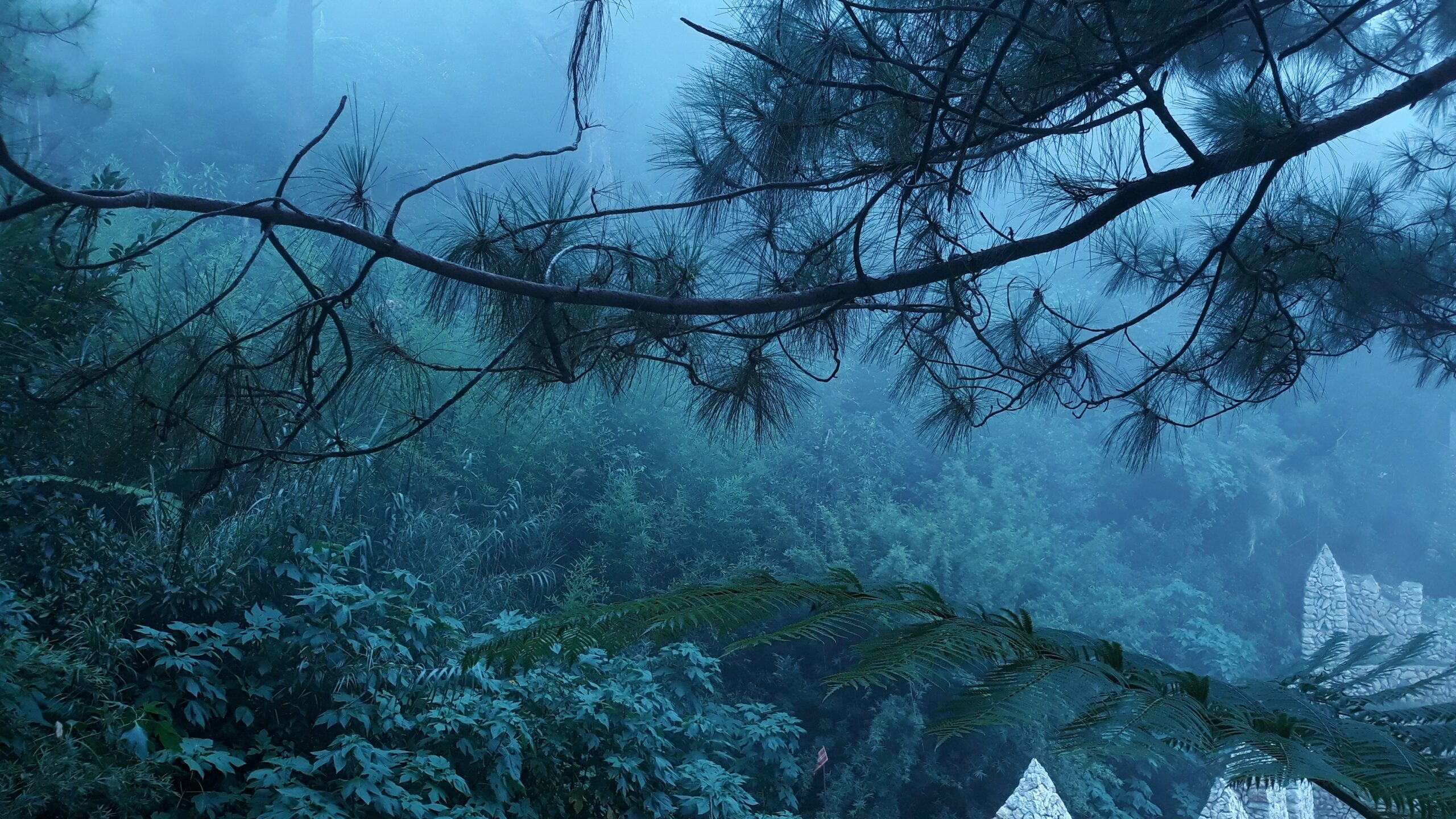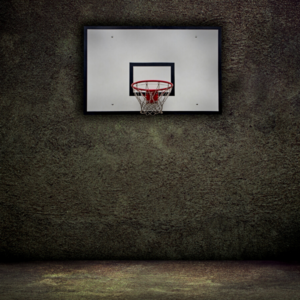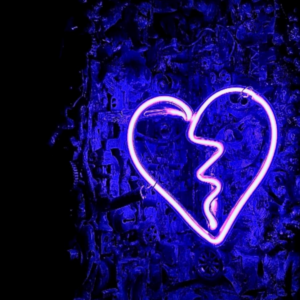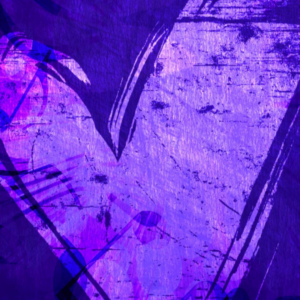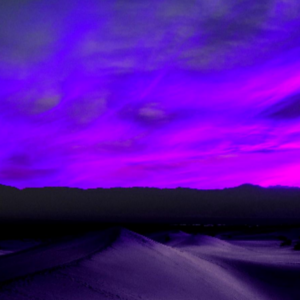Do not go hunting in the blue hour.
That is the creed Reid learned from childhood to their teenaged years, following the footsteps of their parents, treading lightly when winter falls and shuttering windows against the twilight. Blue covers the forest in all its density when the sun goes down, enough to turn snow and stone to facsimiles of water and sky.
The light fades. The world turns blue.
The Fell Beast stalks the forest.
Reid grew up listening to the warnings and tales—a beast with a barn owl’s head and talons like an osprey’s, covered in thick hare fur and stinging brambles, taller than a house and with a lurching gait. He eats whatever he can catch or beguile—for the Fell Beast is wily and knows the forest tongues, able to lure prey to his gaping beak and wicked talons. He preys on anything from mice to human beings.
For all of Reid’s sixteen years they’d learned the stories, trained with a birch bow alongside their parents, and become skilled enough to catch simple prey and ward off dark shapes in the woods. Reid has yet to bring down anything bigger than a rabbit, but their parents are far more skilled than they are, and so far they have not starved.
But this winter is harsh. Its frigid fingers grip Reid’s homestead like iron, drawing guts taut and hollowing divots under eyes. Reid’s parents, the providers of their household, have caught the stilting sickness. Food has dwindled, and no one in the village beyond has enough to spare. If Reid waits, their parents may starve to death before the illness takes them.
Do not go hunting in the blue hour.
But Reid must.
They take their bow and a quiver of arrows and leave the house just as the light turns blue, their parents sleeping in the back room. All day they’d spent tending their sick parents, and it is only now when the blue hour is nigh that Reid has time to hunt. Just to be safe, Reid checks the deadfall traps set around the perimeter of the house, but their hope at avoiding the woods dwindles as the rock-and-stick traps are all untouched.
Reid shakes their arms to stave off lethargy. Just one kill—even a chipmunk, even a squirrel—is all they need to make it one more night. Turning towards the tree line, Reid pauses, breath frosting in the blue air, and listens for the sounds of strange beasts.
No cries. No creaks. Not even a fox or blue jay.
Reid enters the woods.
At once their clothes blend with the light, all dyed indigo and woad instead of madder and yarrow. Their red hair turns purple in the blue hour. Their freckles darken like bruises.
Reid stops every few feet to parse tracks left in the packed snow. A broken branch here, a set of prints there—and then they spot the heart-shaped tracks of a deer ambling north towards the creek.
Enough to feed their family. Enough to survive.
They follow the white-tailed deer tracks down a gully and up the rise on the other side, leaping over the creek’s narrowest part to keep their boots from soaking through. Bow in one hand, Reid keeps a light touch on their quiver as they walk, gloves brushing the notched edge of an arrow should they need to draw it quickly. The crunch of their boots through the ice-crusted snow is the snap of tiny bones.
The tracks’ stride lengthens. Reid follows, quickening their pace as if they were in pursuit, mimicking the deer’s trail around fallen branches and over a log—
They find the doe half-eaten.
Reid’s round nose wrinkles as they approach the carcass. Ice clings to the doe’s open ribcage and its glassy eyes. Blood that should be red is sloe berry blue around the doe’s wounds and the churned snow beneath it. It is no longer steaming; whatever ate it had had its fill and left the rest for scavengers, yet no bird or other predator has touched the doe as far as Reid can tell.
Bad sign. As much meat as there is left over, Reid’s gut twists at the thought of taking something tainted back to their family.
They crouch near the doe’s spine to get a better look at the marks of what killed it. Slashes, like those of a knife blade. Sharp toothless bites, like those of a bird.
Reid’s eyes fall on the bloodied snow. Heavy tracks unlike any animal they know surround the dead deer.
They stand up and retreat slowly. Their hand grips their bow to still their own tremors.
“Hello, there.”
Reid freezes at the creaky voice behind them. Their other hand drifts to their quiver.
“Come, now, no need for hostility. Look upon me and see that I mean you no harm.”
Reid’s spine tingles with anxiety. Something shuffles ten feet behind them, moving in a slow, awkward gait as if unused to walking on two legs. Bow clenched in their gloved hand, Reid glances at the Fell Beast.
Up close, his coat is not all hare fur, but a patchwork of forest beasts: wolf and wolverine, bear and bobcat, mouse and mink. He towers over Reid, true, but he would fit within the roofline of their house. He smells of rot and pine. His blue-black eyes reflect Reid’s face in their pupils.
Deep blue blood coats his talons and beak.
“And who are you?” he asks, so casual, so calm.
Reid knows better than to give their real name. “Rory,” they answer.
“You look so tired, Rory,” the Beast croons. He tilts his owlish head, feathers splaying along his neck. His bloodied talons clack as he flexes his fingers. “Are you well? Eating enough?”
“Fine, thank you,” Reid says.
They watch the Fell Beast warily, following the creature’s every move as he circles them. The Beast clicks his tongue disapprovingly, looking Reid up and down like a cut of meat at market.
“You don’t look fine,” the Beast says. “How your cheeks have sunken, how the light fails to reach your eyes! You need nourishment, sustenance. You poor thing. You’re nothing but skin and bones.”
Reid swallows. The blood on the Beast’s beak is so dark, so blue.
“Not worth eating, then, I suppose,” Reid says.
“Now, now, let’s not jump to conclusions.” The Fell Beast continues to stalk, dragging its patchwork fur along the snow, brambles scratching the top layer of ice. In small gaps between the fur Reid sees oak-bark skin, chinks just small enough for an arrowhead.
“I thought you said you mean me no harm?” Reid asks.
“Did I say that?” the Beast replies, tapping a talon against his beak in thought. “I can’t recall. Perhaps it was lost in translation; I don’t speak human much, after all.
“But never you mind,” he continues. “You look dreadful, Rory. I’ve seen humans like you wander these woods—tired, worn thin, hunger hanging off their bones. They never lasted long, and they always denied my help.” The Fell Beast shakes his head pityingly.
He reaches a four-fingered hand out, talons curled like sickles, every nail blue, blue, blue.
“Become my ward, Rory. Hunger will never touch you again.”
Reid hesitates.
Their gut pangs with need. Their muscles drag now that Reid has stopped walking. In the selfish part of their soul Reid thinks oh, it would be easier, to lie down and submit to the winter’s ragged beast—to let those talons flash and rid them of the pain of living.
The cold stings their cheeks. When Reid blinks they remember their parents in bed, the warmth of their homestead, the task fallen to them to provide.
No one else will save them.
Reid raises their head to meet the Fell Beast’s eyes.
“No,” they say.
The feathers on the Fell Beast’s head ruffle out in outrage. His skin creaks beneath his patchwork fur. Eyes of gnarled silver birch open along his body, the pupils blue as ice, piercing, rabid, cold.
“Do not deny me, child!” he cries, his voice the grating edge of a jackdaw.
Reid runs.
Fast as a deer they race down the gully and across the narrow creek, arrows rattling in their quiver, bow clenched in their fist like a lifeline. Their heart beats loud enough to make their ears ring.
The Fell Beast leaps upon them like a raptor.
Reid cries in pain as talons slash their arm, cutting through their thick hide jacket as easily as snow. Reid turns, stumbles, back hitting a tree—they duck just as the Fell Beast slams their talons into the bark where Reid’s head had been.
Reid darts away, feet propelling them forward over snow-coated lumps and buried leaf litter. The blood from their arm falls dark blue onto the snow. All around them, the blue hour overwhelms their sight: blue sky, blue shadow, blue trees and blue ice, blue arrow fallen from blue quiver into blue snow—
Reid pushes their way up a slope. Their throat burns with blue cold.
Behind them, the Fell Beast lopes ever closer.
“Foolish child,” the Fell Beast hoots, “you had one chance to make things easy for yourself. Would you really go back to your starving ways?”
Reid staggers, panting, hunger bleeding their limbs of strength. Shadows spot their vision.
The bow is steady in their hand.
Reid pivots, facing the Fell Beast, edging their back against two pine trees too thick for the Beast to circumvent. Their quiver is half-empty, starving.
“I know my life is not easy,” Reid counters. “My parents and I work to keep our homestead alive. The nearest village is five miles away. When we fall on hard times, we feel their teeth.”
They draw the bow, nock an arrow, aim the flint point at a chink of bark skin between the Beast’s eyes.
“But I would not trade it for death.”
Reid releases.
They duck as soon as the arrow leaves their hand, not looking to see where it hit—and a horrid howl jars their eardrums, a shrill sound like half the forest screaming all at once.
Reid hunches in the blue shadow of the pine trees, hands pressed over their ears to deaden the death cry. Only when half a minute has passed do they lower their hands and peer at the bloodied snow.
The Fell Beast lies still, a heap of lifeless flesh and fur.
Reid stands, legs quivering, lungs burning as they stare at the body. Their arrow, slick with blue blood, sticks out of the back of the Fell Beast’s owl head. Its patchwork fur does not stir. The birch-bark eyes along its body are petrified, unseeing.
The light is fading. The blue hour draws closed.
Reid leaves the arrow where it is. Rot wafts from the Fell Beast’s body. Slinging their bow over their shoulder, Reid clutches their bleeding arm and trudges, winded, towards their homestead, foraging bark to boil to survive one more night.
They let winter consume the body.
